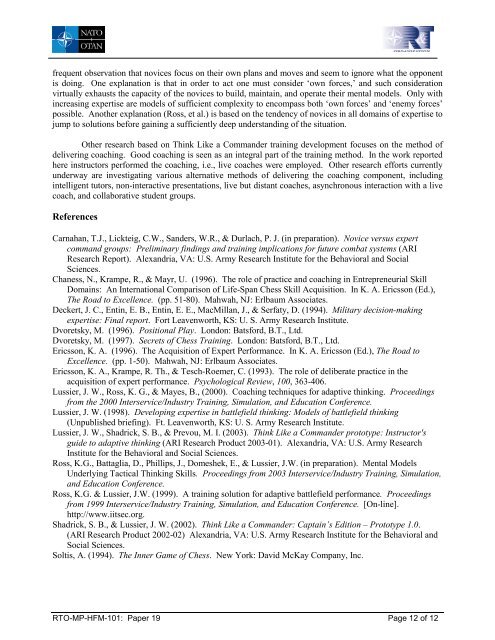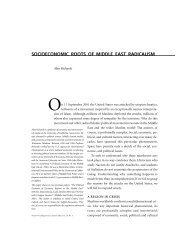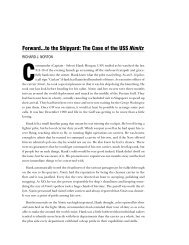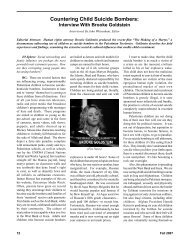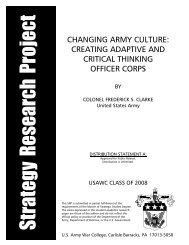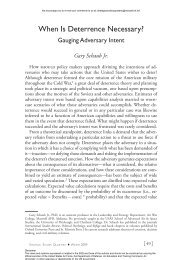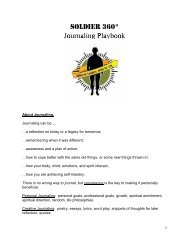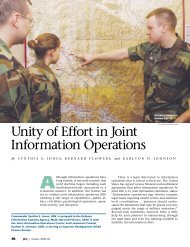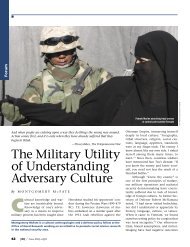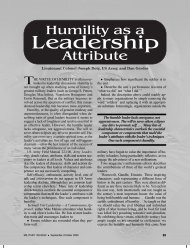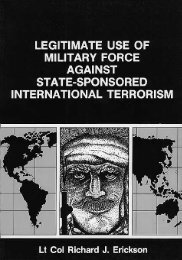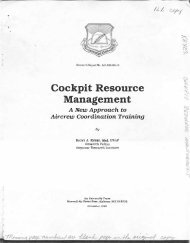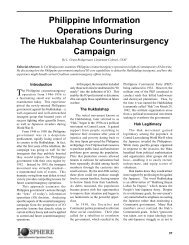Adaptive Thinking Training For Tactical Leaders
Adaptive Thinking Training For Tactical Leaders
Adaptive Thinking Training For Tactical Leaders
You also want an ePaper? Increase the reach of your titles
YUMPU automatically turns print PDFs into web optimized ePapers that Google loves.
frequent observation that novices focus on their own plans and moves and seem to ignore what the opponent<br />
is doing. One explanation is that in order to act one must consider ‘own forces,’ and such consideration<br />
virtually exhausts the capacity of the novices to build, maintain, and operate their mental models. Only with<br />
increasing expertise are models of sufficient complexity to encompass both ‘own forces’ and ‘enemy forces’<br />
possible. Another explanation (Ross, et al.) is based on the tendency of novices in all domains of expertise to<br />
jump to solutions before gaining a sufficiently deep understanding of the situation.<br />
Other research based on Think Like a Commander training development focuses on the method of<br />
delivering coaching. Good coaching is seen as an integral part of the training method. In the work reported<br />
here instructors performed the coaching, i.e., live coaches were employed. Other research efforts currently<br />
underway are investigating various alternative methods of delivering the coaching component, including<br />
intelligent tutors, non-interactive presentations, live but distant coaches, asynchronous interaction with a live<br />
coach, and collaborative student groups.<br />
References<br />
Carnahan, T.J., Lickteig, C.W., Sanders, W.R., & Durlach, P. J. (in preparation). Novice versus expert<br />
command groups: Preliminary findings and training implications for future combat systems (ARI<br />
Research Report). Alexandria, VA: U.S. Army Research Institute for the Behavioral and Social<br />
Sciences.<br />
Chaness, N., Krampe, R., & Mayr, U. (1996). The role of practice and coaching in Entrepreneurial Skill<br />
Domains: An International Comparison of Life-Span Chess Skill Acquisition. In K. A. Ericsson (Ed.),<br />
The Road to Excellence. (pp. 51-80). Mahwah, NJ: Erlbaum Associates.<br />
Deckert, J. C., Entin, E. B., Entin, E. E., MacMillan, J., & Serfaty, D. (1994). Military decision-making<br />
expertise: Final report. <strong>For</strong>t Leavenworth, KS: U. S. Army Research Institute.<br />
Dvoretsky, M. (1996). Positional Play. London: Batsford, B.T., Ltd.<br />
Dvoretsky, M. (1997). Secrets of Chess <strong>Training</strong>. London: Batsford, B.T., Ltd.<br />
Ericsson, K. A. (1996). The Acquisition of Expert Performance. In K. A. Ericsson (Ed.), The Road to<br />
Excellence. (pp. 1-50). Mahwah, NJ: Erlbaum Associates.<br />
Ericsson, K. A., Krampe, R. Th., & Tesch-Roemer, C. (1993). The role of deliberate practice in the<br />
acquisition of expert performance. Psychological Review, 100, 363-406.<br />
Lussier, J. W., Ross, K. G., & Mayes, B., (2000). Coaching techniques for adaptive thinking. Proceedings<br />
from the 2000 Interservice/Industry <strong>Training</strong>, Simulation, and Education Conference.<br />
Lussier, J. W. (1998). Developing expertise in battlefield thinking: Models of battlefield thinking<br />
(Unpublished briefing). Ft. Leavenworth, KS: U. S. Army Research Institute.<br />
Lussier, J. W., Shadrick, S. B., & Prevou, M. I. (2003). Think Like a Commander prototype: Instructor's<br />
guide to adaptive thinking (ARI Research Product 2003-01). Alexandria, VA: U.S. Army Research<br />
Institute for the Behavioral and Social Sciences.<br />
Ross, K.G., Battaglia, D., Phillips, J., Domeshek, E., & Lussier, J.W. (in preparation). Mental Models<br />
Underlying <strong>Tactical</strong> <strong>Thinking</strong> Skills. Proceedings from 2003 Interservice/Industry <strong>Training</strong>, Simulation,<br />
and Education Conference.<br />
Ross, K.G. & Lussier, J.W. (1999). A training solution for adaptive battlefield performance. Proceedings<br />
from 1999 Interservice/Industry <strong>Training</strong>, Simulation, and Education Conference. [On-line].<br />
http://www.iitsec.org.<br />
Shadrick, S. B., & Lussier, J. W. (2002). Think Like a Commander: Captain’s Edition – Prototype 1.0.<br />
(ARI Research Product 2002-02) Alexandria, VA: U.S. Army Research Institute for the Behavioral and<br />
Social Sciences.<br />
Soltis, A. (1994). The Inner Game of Chess. New York: David McKay Company, Inc.<br />
RTO-MP-HFM-101: Paper 19 Page 12 of 12


